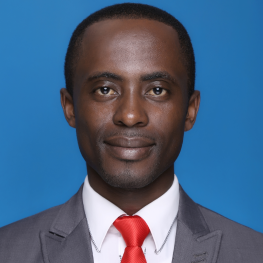
Chizoba Ignatius Ezugwu
GET-COFUND MARIECURIE FELLOW AT UAH
Evaluation of solar-driven photocatalytic conversion of carbon dioxide (CO2) into hydrocarbon fuels using amine based bimetallic metal-organic frameworks
About the research project « Evaluation of solar-driven photocatalytic conversion of carbon dioxide (CO2) into hydrocarbon fuels using amine based bimetallic metal-organic frameworks »
Research line: Carbon capture technologies
Mentor: Prof. Roberto Rosal
Abstract:
Energy shortage and global warming are two of the most crucial issues this century. Alternate renewable energy source other than fossil fuel which emits CO2 is needed. The most emerging and promising technology for CO2 fixation is artificial photosynthesis. The large surface area, tuning flexibility and semiconductivity of metal-organic frameworks (MOFs) make them perfect candidates for artificial photosynthesis. The development of materials for the activation and conversion of CO2 to valuable chemicals and close the carbon cycle is a current worldwide knowledge gap. The aim of the project is to design and develop efficient large-scale carbon capture and solar-driven conversion processes and to implement them into industrial schemes. Series of amine containing Zirconium MOFs will be prepared and their CO2 adsorption capacity will be compared with Zr-MOFs without amine. Then, post-synthetic exchange technique will be used to incorporate bimetallic nodes into the amine Zr-MOFs. The bimetallic nodes will comprise earth abundant metals whose oxo-clusters, like O-Fe, are also visible light responsive, thereby enhancing the electron conductivity and visible light absorption of the MOFs. The amine bimetallic MOFs will be used to harvest visible-light and photocatalytically convert the adsorbed CO2 into hydrocarbon fuels. The operational cost, durability and pathway mechanism will be studied in detail and implemented into industrial scheme. Expectedly, the proposed amine bimetallic MOFs will have CO2 photoreduction capacity much higher than other MOFs and conventional photocatalysts. The new hypothesis will give scientific idea on efficient utilization of solar energy to reduce global warming and climate change.
About Chizoba Ignatius Ezugwu
Ezugwu Chizoba Ignatius received his PhD in Material Physics and Chemistry in 2016 at Wuhan University of Technology, China, under the supervision of Prof. Francis Verpoort. At the State Key Laboratory of Advanced Technology for Material Synthesis and Processing, his research interest was focused on design, preparation and modifications of metal-organic frameworks for catalytic organic transformation. While working with Prof. Verpoort, he developed new N-heterocyclic carbene based MOF catalysts that are very efficient for coupling and condensation reactions. His PhD research was fully sponsored by Chinese Government Scholarships and he was awarded the «2016 Outstanding International Graduating Student Award» of Wuhan University of Technology. In 2017, he joined the Sun Yat-sen University, China, as a postdoctoral fellow. During this period, he researched on the synthesis of different MOFs for adsorption and catalytic removal of gaseous pollutants, such as CO2 and carcinogenic indoor formaldehyde. He is a reviewer of SCI journals and has completed some projects successfully. As a result of his cutting-edge researches, he has published several interesting peer-reviewed scientific publications in international journals of high prestige and participated in many conferences. Presently, he is developing advanced hybrid catalytic materials for CO2 reduction as a GET-COFUND MarieCurie Fellow at the University of Alcala and IMDEA Water Institute.






